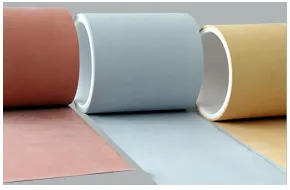
Some industries need glass fiber with thermal conductive silicone sheet due to their special application environment. Although it is known that glass fiber will reduce the thermal conductivity, why should thermal conductive silicone sheet with glass fiber?
There are many reasons, summarized as three points. First of all, thermally conductive silicone sheet is a soft and elastic thermally conductive gasket. Its toughness is not high. It is easy to find tearing under external force. The thinner the thickness, the lower the tensile strength and the more susceptible to external forces.
Then, the thermally conductive silicone sheet is soft in texture, and it is easily deformed and damaged by manpower during lamination. After glass fiber reinforcement, its toughness can be improved, and it is easier to handle and not deform.
Secondly, in some occasions, the application environment is harsh, and corrosion-resistant and durable thermal conductivity materials are required. The thermal conductive silicone sheet with glass fiber is essentially adding a layer of glass fiber in the production process, and the glass fiber has excellent chemical resistance, acid corrosion resistance, etc. Etc., so it can improve the stability of the thermally conductive silicone sheet.

 English
English
 usheenthermal
usheenthermal



